Recently, Feminism In India has been subject to a deluge of criticism from many in the right wing. In this statement, we would like to clarify our stances on the issues we have been criticised for. While we recognise that some of this criticism is made in good faith, much of it has been unfounded and hateful, and affected us deeply.
For a time, we thought it best to ignore this and continue to focus on our work, which is to platform the voices of a diverse plethora of Indian feminists and advocate for feminist ideals and concepts using our large platform. However, it has been unrelenting, and also poses the danger of derailing our work and eclipsing the many issues we work on – sexual and reproductive health and rights, violence against women, feminist history, LGBTQ+ rights, pop culture reviews, feminist news analysis, law and policy, etc.
The most strident of this critique is that we are an organisation with an “anti-Hindu, pro-Islam agenda”. This first cropped up last year, after some Twitter users took issue at an article that criticised Hindu festivals for being unfair to women, with the expectation of women having to do all the work of preparing food and setting up the pujas at a time that is ostensibly meant to be a time of celebration and festivities. (We have similar articles, for instance, criticising the practice of being forced to fast during Ramadan, despite not being scripturally required to, on one’s period.)
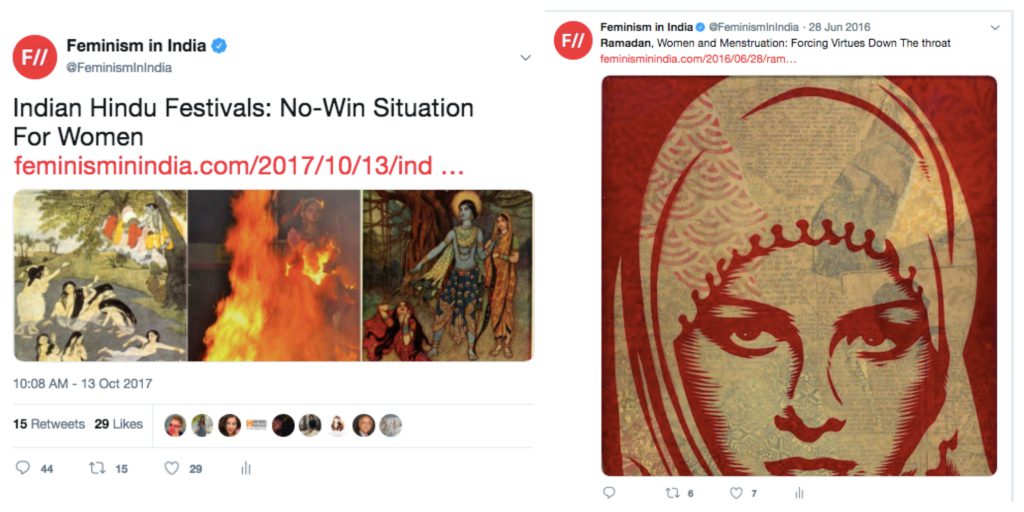
We also have articles that identify women-centric traditions within Hinduism, like several articles about the Bhakti movement and its saints and on female ascetics.

Enraged at the article that called Hindu festivals a no-win situation for women, Twitter trolls took it upon themselves to unearth our website’s domain details, and found that our website was registered under the name of a Muslim man. This person had helped out FII Founder-Director Japleen Pasricha in 2013, when she set up the website, with getting our domain name registered. We were unaware that these domain details were publicly searchable, and so these trolls took screenshots of this man’s name, address and phone number, and spread it all over Twitter, doxxing him and putting his safety under threat.
Despite having no connection with FII apart from helping us out in those initial days, this Twitter hatred had put him in a position where he was vulnerable to a hate crime. We were obviously distraught, and immediately got the domain details transferred to Japleen and made them private, and were in conversation with Twitter India authorities to take down these screenshots that doxxed him.
However, it has been since then that the first rumour began that FII was headed by a Muslim man with an anti-Hindu agenda, which it is not. Despite clarifying repeatedly that our core team is comprised of four women, and led by Japleen Pasricha, that screenshot and these rumours continue to crop up. We would like to request our supporters to notify us (by tagging our social media handles or emailing us) if you ever see this screenshot so we can take the necessary measures of getting it taken down, as it threatens someone’s safety.
Since then, we’ve been accused of publishing articles glorifying practices associated with Islam like the triple talaq and the hijab, and denigrating Hindu customs and traditions. These critiques have cherrypicked articles on FII that match this rhetoric, while ignoring others that vary from this narrative of FII’s supposed agenda.
FII’s stance is only that we let communities that have been historically marginalised speak for themselves. Our editorial policy, in a bid to avoid non-appropriation of marginalised voices, insists that issues affecting a certain community be written by members from within that community. In this vein, we stand by the struggles of Dalit women, Muslim women, queer women, women with disabilities among others, in telling their own stories to the world.
These critiques have cherrypicked articles on FII that match this rhetoric, while ignoring others that vary from this narrative of FII’s supposed agenda.
We have published a plethora of articles criticising the practice of triple talaq, a battle that has been fought by Muslim women for decades (much before the BJP government came into power). We have an interview with Zakia Soman, the head of Bharatiya Muslim Mahila Andolan (BMMA), a lead petitioner in the case to abolish triple talaq.

We also have pieces that critique the Triple Talaq Bill (which many critics find indistinguishable from the abolition of the practice of triple talaq). The Bill has been opposed by Muslim men and women, including those who fought for the abolition of the practice, as it treats the issue as a criminal offence instead of a civil one, and bestows third parties the right to complain against the husband, leaving the already marginalised community vulnerable to arbitrary criminalisation.

Similarly, with respect to the hijab, our stance is only to let Muslim women to speak for themselves. We have a variety of articles written by Muslim women with differing perspectives on the hijab. Some have written about abandoning it as they found it an oppressive patriarchal symbol or had it forced upon them, while others have written about wearing the hijab as a symbol of their faith or their culture, in an increasingly hate-filled society that denies them the space to express it.
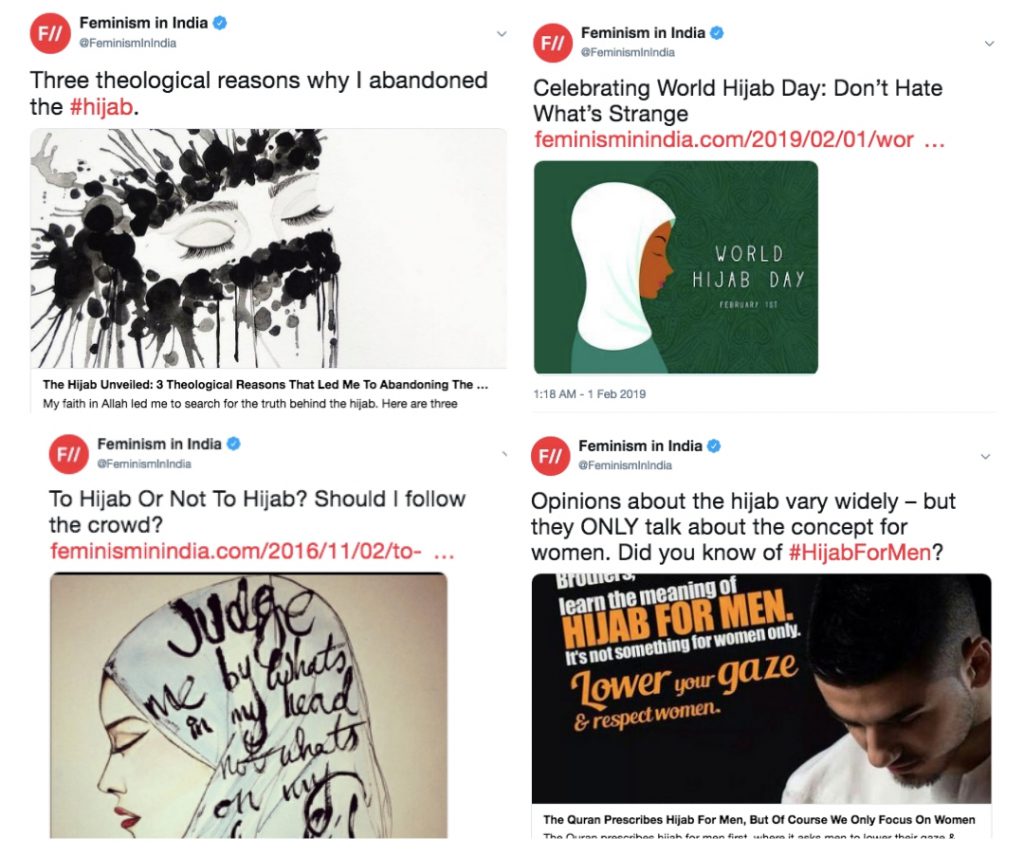
Our articles cover a spectrum of issues by writers from diverse backgrounds. Many of these attack the cultures and traditions that these writers have grown up with, as “tradition” is one of the biggest justifications given in the normalisation and continuation of patriarchy. We have articles by Christian writers, for instance, who criticise the Church on its silence over many pressing issues including the harassment and rape of nuns, on its silence on homosexuality and on pedophilia. We have articles by Hindu writers criticising Hindu traditions that marginalise women on various grounds, including menstruation. We have articles by Dalit, Bahujan and Adivasi writers who criticise the upper caste domination and the active exclusion of lower castes in many Hindu practices and festivals.
Another popular critique is that FII is “bringing caste into feminism”, due to the many articles we publish highlighting Dalit women’s experiences and the rampant caste-based discrimination that exists in India. Our ethos has firmly been that of intersectional feminism, and we believe that all systems of oppressions are interlinked and one cannot be overthrown without the other.
We are currently living in an era of India’s democracy where the hatred and violence inflicted upon Muslims and Dalits has reached dizzying levels. One cannot open a newspaper without reading of a new hate crime against these communities. In this environment, we believe it necessary to stand by and support these communities against the discrimination and hatred that they are subjected to, and publish their stories in their voices.
FII’s stance is only that we let communities that have been historically marginalised speak for themselves.
FII has been subject to relentless trolling on Twitter, that reflects the most extreme and bigoted views towards Muslims and Dalits. Our notifications are flooded with the vilest slurs and insults towards these communities. We understand that this is part and parcel of working against oppressive systems of domination, especially in today’s India, but that doesn’t mean it doesn’t affect our mental health and motivation severely.
The bottomline is that FII supports a diversity of voices, as long as they do not encourage or normalise bigotry. Our aim has always been to spotlight the voices and opinions of those who are not often given the space to express them. Some of our articles may even have contradictory stances to one another, because we recognise that feminism allows for multitudes of opinions within itself, as different people find different paths towards emancipation, gender equity and social justice. At FII, we have room for them all.
Signing off,
Team FII
About the author(s)
Feminism In India is an award-winning digital intersectional feminist media organisation to learn, educate and develop a feminist sensibility and unravel the F-word among the youth in India.
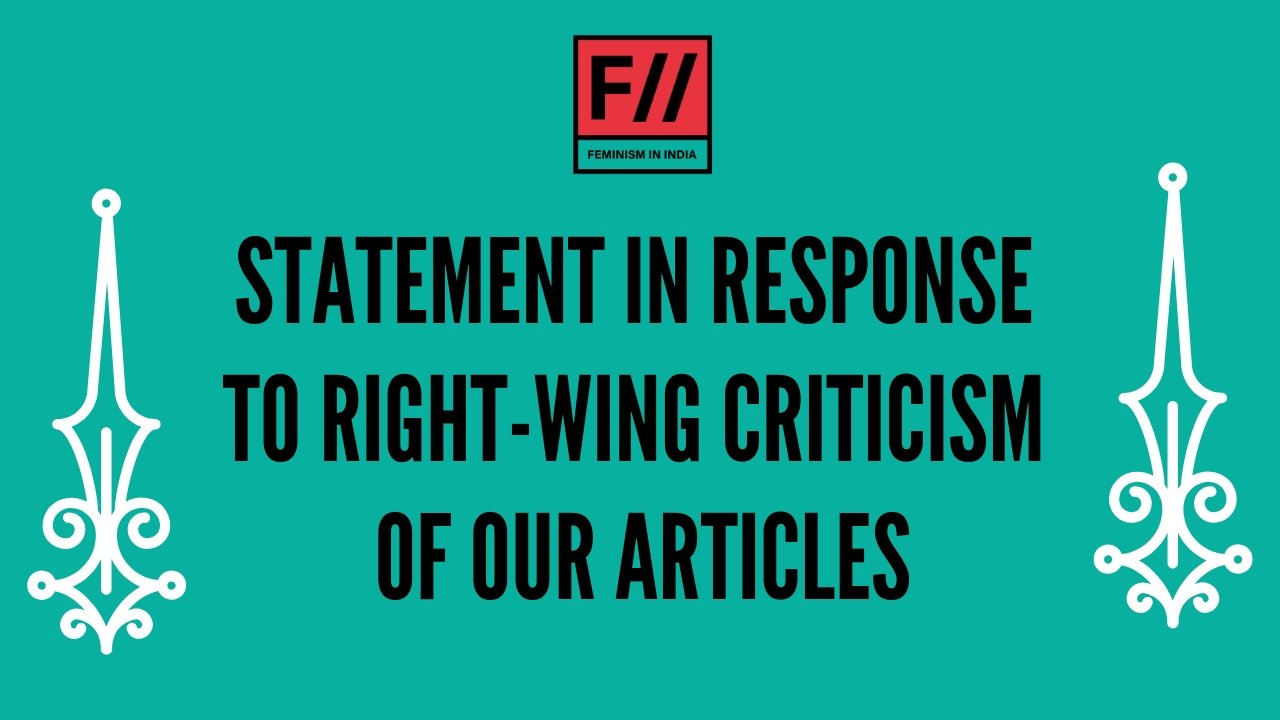

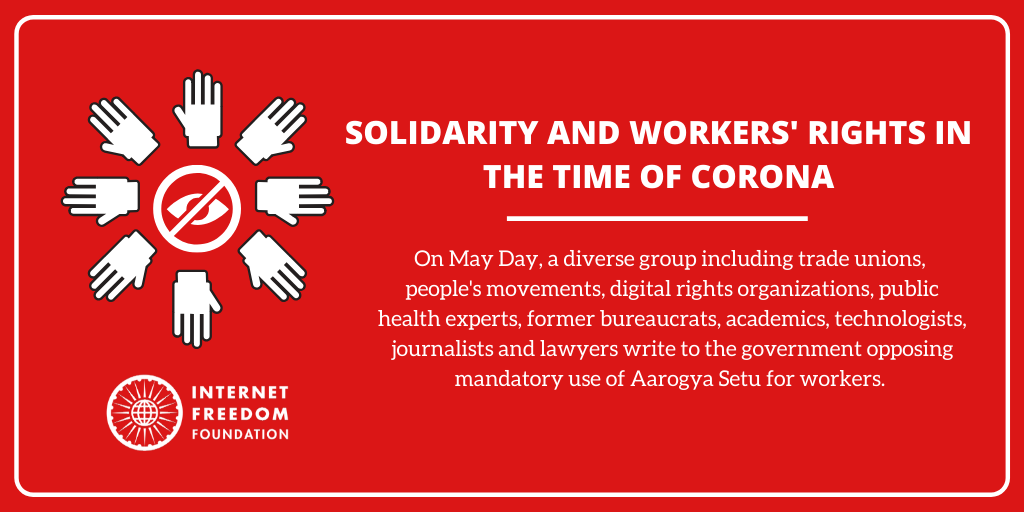
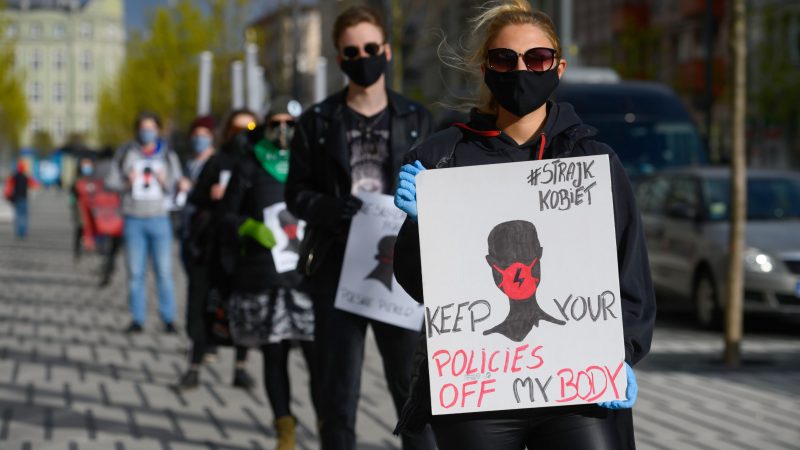

I’m sorry that your team of wonderful women have had to deal with such trolling just for providing a space to marginalized voices. I want to heartily congratulate you for keeping your stance strong and responding to the critics in such logical and coherent way. Although, I think we all know that those trolling or criticing aren’t falling short of any facts or logics, all the articles are there to view. Its the deep hatred, its the emotion tha’ts guiding them and they would do anything, ignore anything and notice anything just to validate their points. Your team is doing a great service in these times where you righty pointed, that not one day you can open a newspaper without at least a couple of hate crimes against minorities and marginalized communities.
My best wishes to your team and I look forward to reading diverse voices on your platform everyday. 🙂 You Go Girls!
Aah the ‘peacefuls”
Much love and standing in solidarity with everyone at FII.
How are women in Hinduism historically marginalised, when they are both in temples and governments. We have always had queens and women warriors. And why is the role of Islam and Victorian morality not considered in dilution and distortion of women’s roles in Hinduism? After all we had neither the ghunghat prat before Islam entered HIndostan, and women in many part of the country roamed without an upper garment. Please respond.
Exactly there is no such tradition of covering face before Islam came to Bharat
Beautifully written. Keep up the good work.
I respectfully disagree. The examples you posted pertaining to the Hijab, lets analyse them
1. Three theological reasons why I abandoned the Hijab
2. To Hijab or not to Hijab? Should I follow the crowd?
These titles are framed as a personal opinion and choice issue. Not as an institutional problem. Compare that to some of your controversial headlines pertaining to Hinduism.
1. As Druga Puja winds down, let’s ask if the Hindu trope of goddess worship really translates to women empowerment?
2. Is ghoonghat the identity of Haryana? Patriarchal control over woman’s body and sexuality.
3. Both nature and women are constantly controlled and used by men in Hindu mythology to establish their supremacy over others.
These are criticisms are framed about hinduism itself aka over the institution rather than the struggle of the author or their choices.
Perhaps you should not disregard all criticism as right wing trolls. Because what does right-wing in the context of India really mean? American or European political spectrum isn’t really applicable to India.
Regards,
Varun
Well said!
Even if you are writing against some community, you have right to do so. Similarly they have right to reply. But if they threaten you, its an criminal offense. Most of the times, I don’t agree with your views and often criticized them, but I have never threaten or abused you. Discussions and conversations are pillars of civilized society, and we should pursue that only. But I would request writers to reply to their criticism in most positive and rationale way, so that there can be intellectual growth of both sides. Thanks 🙂
Why don’t you ask Hindu women around you what they are facing? Be more observant than ignorant. We don’t want to be worshipped, we want our rights and there is so much discrimination internally in Hinduism, women ka toh bhul jao. Have you seen the amount of domestic violence, crimes and other very everyday issues women face. I can’t start to explain the abcd to you. You need to educate yourself.
The comment was in response to the comment by ‘Here and Now’
While I am not ok with trolling, I think this should be a moment of introspection for the FII team. You probably need to reach out to more diverse voices and also attack institutions that push for women to be a certain way, even if it’s the culture. Women are not anyone’s property and should not take the burden of “upkeep of culture”.